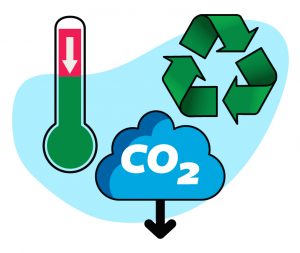Manufacturing is the largest sector of the American economy. It stands at the center of our country’s success and contributes to many job opportunities throughout the United States. From retail to construction, transportation to utilities, the manufacturing sector is closely connected with all other thriving industries across the nation today.
It is no wonder why over 70 percent of Americans today view manufacturing as the most important industry, or why so many people are striving towards a career in this in-demand field. If you are considering a job in manufacturing and want to stand out amongst the competition, it is crucial to learn about the latest technologies, trends, and practices within the field. Let’s take a look at one rising trend that students and laborers alike must know: lean and green manufacturing.
What is Green Manufacturing?

Green manufacturing is the renewal of production processes and the establishment of environmentally-friendly operations within the manufacturing field. Essentially, it is the “greening” of manufacturing, in which workers use fewer natural resources, reduce pollution and waste, recycle and reuse materials, and moderate emissions in their processes.
Green manufacturers research, develop, or utilize technologies and practices to lessen their impact on the environment. As detailed by the Bureau of Labor Statistics, workers at green companies must have specific manufacturing training in green technologies and practices such as:
- Energy from renewable sources. Workers may generate electricity, heat, or fuel from renewable sources for use within their establishment. These sources may include wind, biomass, geothermal, solar, ocean, hydropower, landfill gas and municipal solid waste.
- Energy efficiency. Workers will utilize specific technologies and practices to improve energy efficiency within their establishment.
- Pollution reduction and removal, greenhouse gas reduction, and recycling. Workers will use green technologies and practices to:
- Reduce or remove the creation or release of pollutants in their operations
- Reduce greenhouse gas emissions
- Reduce or eliminate the creation of waste materials
- Collect, reuse, recycle or compost waste materials
- Natural resources conservation. Workers will use specific technologies and practices to conserve natural resources, such as those related to organic agriculture, land management, and soil, water, or wildlife conservation.
In Goodwin’s Green Manufacturing Courses in CT, students learn about the different practices and technologies needed in a green, clean, and lean working environment. They develop the skills necessary to preserve and restore environmental quality in manufacturing, as well as create a green workplace for their companies. By studying local, state and national green/clean/lean/sustainable resources in these courses, students can truly learn how to prepare for the growing green workforce of the future.
How is Green Manufacturing Beneficial?

Not only does green manufacturing benefit the environment, but growing numbers of businesses throughout the country are finding that a focus on recycling and the reduction of waste can benefit their business as a whole. Business owners are seeing improved bottom line and employees are seeing an increase in motivation, morale, and public relations.
Green manufacturing has also become a vehicle for long-term job creation in the United States. According to a recent Quality Magazine article, green manufacturing currently accounts for 26 percent of all clean energy jobs. What’s more, clean and green manufacturing created 35,382 jobs between the years 2003 and 2010 while the rest of the industry shed in numbers. Because of their specialized skills base, clean economy workers earn 13 percent higher salaries than other workers of the U.S. economy.
How Can You Get Started?
Green manufacturing jobs require a strong core skillset and an added layer of green knowledge. These both will stem from the proper manufacturing education and experience in the industry. Enrolling in the right Manufacturing School with specific coursework in Lean and Green Manufacturing will be your first step towards a successful green manufacturing career.
To learn more about how you can get started at Goodwin University’s leading manufacturing school in CT, call 800-889-3282 or visit www.goodwin.edu/manufacturing. You can also see our video for three reasons why manufacturing is a smart career choice.
Goodwin University is a nonprofit institution of higher education and is accredited by the New England Commission of Higher Education (NECHE), formerly known as the New England Association of Schools and Colleges (NEASC). Goodwin University was founded in 1999, with the goal of serving a diverse student population with career-focused degree programs that lead to strong employment outcomes.

